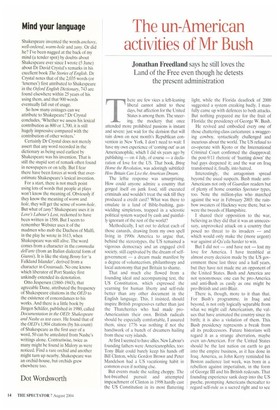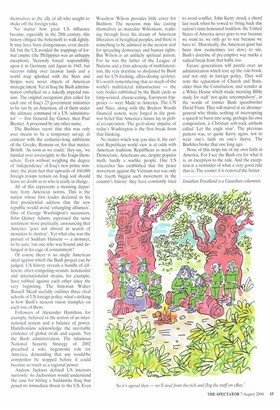The un-American activities of Mr Bush
Jonathan Freedland says he still loves the Land of the Free even though he detests the present administration
here are few vices a left-leaning liberal cannot admit to these days, but affection for the United States is among them. The sneering, the mockery that once attended more prohibited passions is instant and severe: just wait for the derision that will rain down on next month's Republican convention in New York. I don't need to wait: I have my own experience of 'coming out' as an Americanophile, which I did six years ago by publishing — on 4 July, of course — a declaration of love for the US. That book, Bring Home the Revolution, was adoringly subtitled: How Britain Can Live the American Dream.
The leftie response was unsurprising. How could anyone admire a country that gorged itself on junk food, still executed criminals and wouldn't treat the sick till they produced a credit card? What was there to emulate in a land of Bible-bashing, gunwielding simpletons, trapped in a sclerotic political system warped by cash and painfully ignorant of the rest of the world?
Methodically, I set out to defeat each of those canards, drawing from my own spell living in 1990s America to argue that, behind the stereotypes. the US remained a vigorous democracy and an engaged civil society, still captivated by the dream of selfgovernment — a dream made manifest by a degree of volunteerism, philanthropy and local autonomy that put Britain to shame.
That and much else flowed from a founding ideal and accompanying text, the US Constitution, which expressed the yearning for human liberty and self-rule better than any other document in the English language. This, I insisted, should inspire British progressives rather than just the Thatcherites who had made proAmericanism their own. British radicals should be especially comfortable, I assured them, since 1776 was nothing if not the handiwork of a bunch of dreamers hailing from these very islands.
At first I seemed to have allies. New Labour's founding fathers were Americanophiles, too: Tony Blair could barely keep his hands off Bill Clinton, while Gordon Brown and Peter Mandelson had a US vacationing habit in common even if nothing else.
But events made the sailing choppy. The hot-breathed pursuit and attempted impeachment of Clinton in 1998 hardly cast the US Constitution in its most flattering light, while the Florida deadlock of 2000 suggested a system creaking badly. I manfully came up with defences to both attacks. But nothing prepared me for the fruit of Florida: the presidency of George W. Bush.
He revived and embodied every one of those chattering-class caricatures: a swaggering cowboy, syntactically challenged and incurious about the world. The US refusal to co-operate with Kyoto or the International Criminal Court confirmed the disapproval: the post-9/11 rhetoric of 'hunting down' the bad guys deepened it; and the war on Iraq transformed it, finally, into hatred.
Interestingly, the antagonism spread beyond the usual suspects. Bush made antiAmericans not only of Guardian readers but of plenty of home counties Spectator types, too. Note the million-plus who marched against the war in February 2003: the rainbow sweaters of Hackney were there, but so were the tweeds of Hampshire.
I shared their opposition to the war, believing as they did that it was an unnecessary, unprovoked attack on a country that posed no threat to its invaders — and which would only make the (more urgent) war against al-Qa'eda harder to win.
But I did not — and have not — lost my love for America. I have trembled at almost every decision made by the US government these last three and a half years, but they have not made me an opponent of the United States. Bush and America are not synonymous: one can be pro-America and anti-Bush as easily as one might be pro-British and anti-Blair.
There is, though, more to it than that. For Bush's programme, in Iraq and beyond, is not only logically separable from what we might call Americanism, the values that have animated the country since its birth; it is also a violation of them. This Bush presidency represents a break from all its predecessors. Future historians will regard it as a strange aberration, maybe even un-American. For the United States should be the last nation on earth to get into the empire business, as it has done in Iraq. America, as John Kerry reminded his Boston audience last week, was born in a rebellion against imperialism, in the form of George III and his British redcoats. That founding experience sank deep into the US psyche, prompting Americans thereafter to regard self-rule as a sacred right and to see themselves as the ally of all who sought to shake off the foreign yoke.
No matter how great US influence became, especially in the 20th century, this history obliged the behemoth to walk lightly. It may have been disingenuous, even deceitful, but the US avoided the trappings of formal empire (the Philippines was an unhappy exception). Necessity forced responsibility upon it in Germany and Japan in 1945, but viceroys ruling over faraway lands and a world map splashed with the Stars and Stripes were never objects of American strategic intent. Yet in Iraq the Bush administration embarked on a nakedly imperial mission. The original occupation plan called for each one of Iraq's 23 government ministries to be run by an American, all of them under the ultimate command of a US 'administrator' — first General Jay Garner, then Paul Bremer. A proconsul by any other name.
The Bushites retort that this was only ever meant to be a temporary set-up, in contrast with the centuries-long ambitions of the Greeks, Romans or, for that matter, British. 'As soon as we could,' they say, 'we handed over sovereignty to the Iraqis themselves.' Even without weighing the degree of 'independence' of Iraq's new prime minister, the plain fact that upwards of 160,000 foreign troops remain on Iraqi soil should leave no doubt as to who is really in charge.
All of this represents a stunning departure from American norms. This is the nation whose first leader declared in his first presidential address that the new republic would avoid 'entangling alliances'. One of George Washington's successors, John Quincy Adams, expressed the same sentiment more poetically, announcing that America 'goes not abroad in search of monsters to destroy'. Yet what else was the pursuit of Saddam Hussein — a monster, to be sure, but one who was bound and defanged in his cage of containment?
Of course there is no single American ideal against which the Bush project can he judged. US history reveals a bundle of different, often competing strands: isolationist and internationalist strains, for example, have rubbed against each other since the very beginning. The historian Walter Russell Mead usefully outlines three rival schools of US foreign policy; what's striking is how Bush's neocon vision tramples on each one of them.
Followers of Alexander Hamilton, for example, believed in the notion of an international system and a balance of power. Hamiltonians acknowledge the inevitable existence of global rivals and equals. Not the Bush administration. The infamous National Security Strategy of 2002 preached a solo, hegemonic role for America, demanding that any would-be competitor be stopped before it could become so much as a regional power.
Andrew Jackson defined US interests narrowly: no Jacksonian would understand the case for hitting a Saddamite Iraq that posed no immediate threat to the US. Even Woodrow Wilson provides little cover for Bush ism. The neocons may like casting themselves as muscular Wilsonians, realising through force his dream of American liberation of benighted peoples, and there is something to be admired in the neocon zeal for spreading democracy and human rights. But Wilson is an unlikely spiritual patron. For he was the father of the League of Nations and a firm advocate of multilateralism, the very doctrine so disdained by Bush and his UN-bashing, allies-dissing acolytes. It's worth remembering that so much of the world's multilateral infrastructure — the very bodies rubbished by the Bush circle as limp-wristed, cheese-eating, European fripperies — were Made in America. The UN and Nato, along with the Bretton Woods financial system, were forged in the postwar belief that America's future lay in global co-operation. The go-it-alone impulse of today's Washington is the first break from that thinking.
No matter which way you slice it, the current Republican world view is at odds with American tradition, Republican as much as Democratic, Americans are, despite popular myth, hardly a warlike people. One US researcher has established that the peace movement against the Vietnam war was only the fourth biggest such movement in the country's history: they have constantly tried to avoid conflict. John Kerry struck a chord last week when he vowed to 'bring back this nation's time-honoured tradition: the United States of America never goes to war because we want to, we only go to war because we have to'. Historically, the American giant has been slow (sometimes too slow) to stir. Bush's doctrine of pre-emptive war marks a radical break from that habit, too.
Future generations will puzzle over an administration which tore up the rule-book, and not only in foreign policy. They will note the separation of Church and State, older than the Constitution, and wonder at a White House which made morning Bible study for staff 'not quite uncompulsory', in the words of former Bush speechwriter David Frum. They will marvel at an attorneygeneral who thinks nothing of interrupting a speech to burst into song, perhaps his own composition, a Christian soft-rock anthem called 'Let the eagle soar'. The previous pattern was, to quote Kerry again, not to wear one's faith on one's sleeve, The Bushites broke that one long ago.
None of this strips me of my own faith in America. For I see the Bush era for what it is, an exception to the rule. And the exception is a reminder of what a very good rule that is. The sooner it is restored the better.
Jonathan Freedland is a Guardian columnist.



























































 Previous page
Previous page